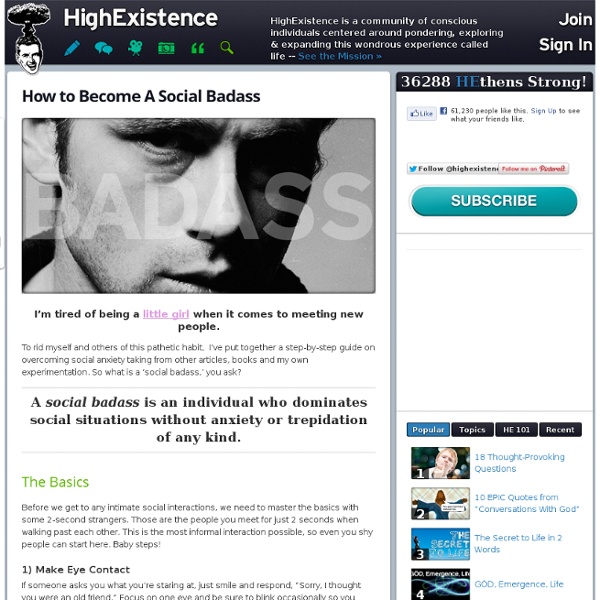Slanke lår og pæne baller - Alt for damerne
Af: Ina Agency. Oversættelse: Marie Kafholz, 13. juli 2011 Disse to effektive øvelser former og opstrammer dine lår og baller, hvis du laver dem dagligt. Øvelse 1 - giver pæne baller 1. Lig på ryggen. 2. 3. Øvelse 2 - strammer lårene op 1. Spænd godt i maven, og løft højre ben, så højt du kan. LÆS OGSÅ: 2 øvelser til »flad mave. Se flere guides Sundhed og motion | 20. sep 2012 Sådan tabte Julie Hastrup 20 kilo på 4 måneder Sundhed og motion | 5. jul 2012 Lynkur gør dig strandklar Sundhed og motion | 7. jul 2011 Træner du uden at tabe dig?
50 Ways to Help the Planet
the quiet place
communication with the quiet place will be operated via the [spacebar] keycommunication with the quiet place will be operated via your fingergently squeeze that key, nowgently touch the screen, now in order to get the most out of your experience please silence your phone, turn on your speakers and press the [f-11] key or [cmd+shift+f] on macin order to get the most out of your experience turn up the volume and rotate landscapeagain, press [spacebar] to continueagain, tap to continue seriously though, silence your phone. it's pointless otherwisedon't worry - this is *not* one of those places that scare the crap out of youdon't worry - this is *not* one of those places that scare the crap out of you welcome to the quiet placeagain, press [spacebar] to continue in the quiet place, there are no capsletters that are all big and yell at you also, there are no facebook notifications or twitter google+ foursquare email messenger etc wow have you ever noticed how many things require your attention? little
Free Resources to Learn and Read Nearly Anything
I believe in the open source movement—in giving the gift of learning and knowledge freely and openly to anyone with an internet connection. And the internet alone is a huge barrier for many, but once you have the internet and a computer, I believe we all should easily have ways to learn. This type of knowledge infrastructure was unfathomable even a few decades ago, but now that we have it, I believe this access is a right, not a privilege. And though I believe in the right for authors, teachers, and creators to make a living from their works (books, online courses, and the like), I don’t see these two ideas as mutually exclusive, and I love that our world is moving closer toward a free exchange of ideas and knowledge. My friend Laura bought a guitar in Thailand and other travelers and locals taught her how to play on the road. Raising access to quality information will define our generation if we let it, and it will shape the next one. Free (and Legal) Places to Download Books
50 Things Everyone Should Know How To Do
Self-reliance is a vital key to living a healthy, productive life. To be self-reliant one must master a basic set of skills, more or less making them a jack of all trades. Contrary to what you may have learned in school, a jack of all trades is far more equipped to deal with life than a specialized master of only one. While not totally comprehensive , here is a list of 50 things everyone should know how to do. 1. 2. 3. 4. 5. 6. 7. 8. 9. 10. 11. 12. 13. 14. 15. 16. 17. 18. 19. 20. 21. 22. 23. 24. 25. 26. 27. 28. 29. 30. 31. 32. 33. 34. 35. 36. 37. 38. 39. 40. 41. 42. 43. 44. 45. 46. 47. 48. 49. 50. Check out these books for more ideas on pertinent life skills:
Online Art History Courses
Whether in education, curation, preservation or sales, art historians help interpret and conserve the art of the past and present. Careers in the field vary widely. Many students of the discipline go into museum jobs like curator, docent, exhibition technician, or preservationist, but there are a number of other fields in which this degree can be used. Art historians are needed in education, both within and outside of museums, as well as in retail: be it in art galleries, appraisal companies and antique shops. Sample Courses Students in art history generally start with an overview of the major traditions and periods in art, including courses on ancient, medieval, Renaissance, Baroque, and contemporary art. Possible Specializations Many students choose to specialize in one of the artistic periods mentioned, possibly focusing on a region, as well. Degree Types Associate Art history students typically get associate degrees in order to transfer those to a 4-year college or university. Master’s



